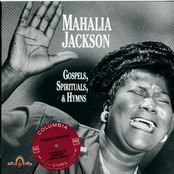GOSPELS, SPIRITUALS & HYMNS

Biography
Mahalia Jackson (October 26, 1911 – January 27, 1972) was an American gospel singer. Possessing a powerful contralto voice, she was referred to as "The Queen of Gospel". Jackson became one of the most influential gospel singers in the world and was heralded internationally as a singer and civil rights activist. She was described by entertainer Harry Belafonte as "the single most powerful black woman in the United States". She recorded about 30 albums (mostly for Columbia Records) during her care...
Mahalia Jackson (October 26, 1911 – January 27, 1972) was an American gospel singer. Possessing a powerful contralto voice, she was referred to as "The Queen of Gospel". Jackson became one of the most influential gospel singers in the world and was heralded internationally as a singer and civil rights activist. She was described by entertainer Harry Belafonte as "the single most powerful black woman in the United States". She recorded about 30 albums (mostly for Columbia Records) during her career, and her 45 rpm records included a dozen "golds"—million-sellers.
"I sing God's music because it makes me feel free," Jackson once said about her choice of gospel, adding, "It gives me hope. With the blues, when you finish, you still have the blues."
Jackson grew up in the "Black Pearl" section of the Carrollton neighbourhood of uptown New Orleans, Louisiana, and began singing in a Baptist church. In 1927 she moved to Chicago, Illinois, where she sang with The Johnson Brothers, one of the earliest professional gospel groups.
The Johnson Brothers broke up in the mid-1930s, and Jackson began her solo career, recording for Decca in 1937. The result, "God's Gonna Separate the Wheat from the Tares", was only a moderate success, but Jackson became a popular concert draw. She didn't record again untill 1946, when she signed with Apollo Records, releasing several singles that are now highly regarded, though sales were sluggish at the time. "Move On up a Little Higher" (1948) became a huge success, however, and stores could not stock enough of it to meet demand. Jackson rocketed to fame in the U.S. and soon afterwards in Europe. "I Can Put My Trust in Jesus" won a prize from the French Academy, and "Silent Night" was one of the best-selling singles in the history of Norway. She began a radio series on CBS and signed to Columbia Records in 1954. With her mainstream success came an inevitable backlash from gospel purists who felt she had watered down her sound for popular accessibility.
Jackson's career in the late 1950s and early 1960s continued to rise when she recorded with Percy Faith, and performed at the 1958 Newport Jazz Festival and the inauguration of John F. Kennedy. She also sang at the funeral of her friend Martin Luther King, Jr. The late 1960s saw a downturn in her popular success. She ended her career with a concert in Germany in 1971; when she returned, she made one of her final television appearances on The Flip Wilson Show.
Jackson died in Chicago on 27th January 1972 of heart failure and diabetes at the age of sixty. She was buried in Providence Memorial Park in Metairie, Louisiana. She was posthumously inducted into the Gospel Music Association's Gospel Music Hall of Fame in 1978.
Read more on Last.fm. User-contributed text is available under the Creative Commons By-SA License; additional terms may apply.

